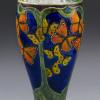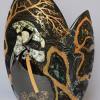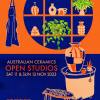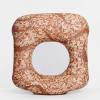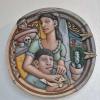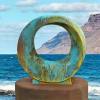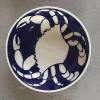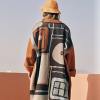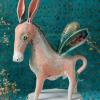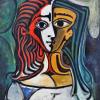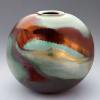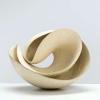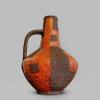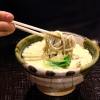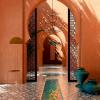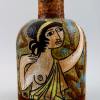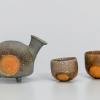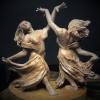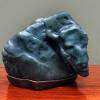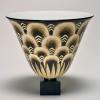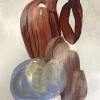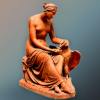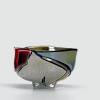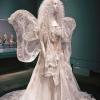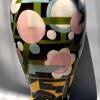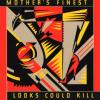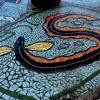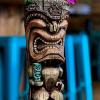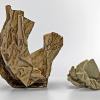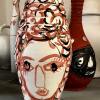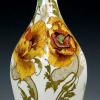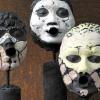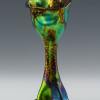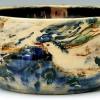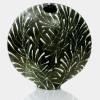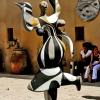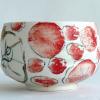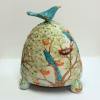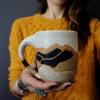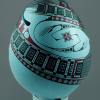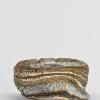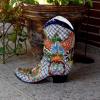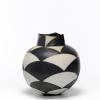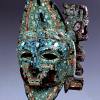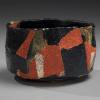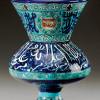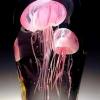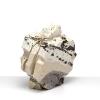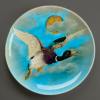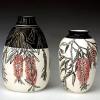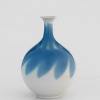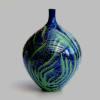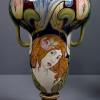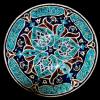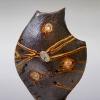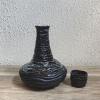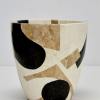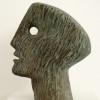Most of the main pottery companies have had flirtations with using various marine themed designs. The sleek, sinuous and diverse shapes of most aquatic animals make them an obvious choice for decorating curvy pottery forms and the multitude of intense colours in the sea world are well suited to the rich glazing palettes. I have included some examples from Moorcroft, Martin Brothers, Haeger, Royal Doulton, Hornsea, Bornholm, Zsolnay and other fine works from individual ceramicists.
Sea creatures were widely represented in the decoration of pottery during the Minoan Civilization ( Crete ), which dates back to 7000BC. The octopus motif became popular around 2700BC to 1500BC and was later adopted by the Mycenaeans. Use of the octopus motif was so widespread that it has been speculated it was an object of worship or mystical significance. The “marine style” developed to include pottery which were covered with fish, octopuses, dolphins, starfish and crabs. The Minoans were organised as a seafaring nation, and it is possible their preference of decoration was an expression of reverence to the sea, which offered protection (navy), wealth (commerce) and food (fish). Such vases and jars were made by trained craftsmen and were prized throughout the Levant ( Eastern Mediterranean ), Egypt, Geece and Northern Africa.
Early Japanese societies and other East Asian cultures used pottery before developing agriculture, and seafood was a dietary mainstay, so it’s no surprise that marine life decoration also appeared on their pottery wares. Early Christians attached special significance to the symbol of the fish and they became associated with specific Christian rituals, including the thanksgiving meal (eucharist) and baptism, and pottery fish decorations were popular in the countries of Christendom. French majolica Palissy wares, developed by Bernard Palissy in the 1500’s, then rediscovered in the 19th century, also represents another ceramic era where aquatic animals were prominently featured in its rustique style.
 Italian Red figure fish plate ca.-340–330B.C
Italian Red figure fish plate ca.-340–330B.C
A Ming Dynasty JiaJing Reign Porcelain Wine Pot
Italian Pottery Vase Abstract Fish Carved Design by Pleasant Valley
Natalya Sots fish motif dish
Natalie Ul’yanova Clay Fish
Goldfish design art glass vase
( Uniques and Antiques , USA )
Moorcroft Pottery Octopus vase
Lenci Art Deco figurine of an aquatic scene with a mermaid and merchild
1935
A ceramic Egyptian “bolti ” ( Nile perch ) whose breeding habits attracted the Egyptians’ attention. After the female perch lays her eggs, the fish draws them into her mouth, where they stay until they hatch and the young emerge. The Egyptians saw this as a kind of spontaneous generation and thus took the perch as a symbol of resurrection and rebirth. The figure is hollow and contains several clay pellets, representing the eggs, which when shaken served as a rattle,
( brooklynmuseum.org )
6th grade fish figure from teacher Joyce Vogels’s art class
( Pinterest )
Katherine Hackl sgraffitto stingray, octopus and fish vessel
Raku Koi pond vessel – Kate & Will Jacobson
Hawaii
A Lambayeque blackware vessel from Peru. Both sides depict Naymlap (their most important diety) in the form of an ocean wave, delivering a bountiful harvest of fish.
700 AD – 1350 AD
( http://ancientartifax.com/ )
Large Royal Haeger Tropical Fish Bowl late 40’s
( Flickr–Haegernerd )
Tanya Casteel Coral Pink Octopus
Egyptian Faience Fish Amulet, around 1391-1335 BCE
( RISD Museum )
Martin Brothers Grotesque style fish sculpture made by Burslem Pottery
( Drakesbrook Antiques and Collectables )
Hand thrown stoneware vase with fish design drawn by hand with black slip (liquid clay)
Artgirl56, Wisconsin -Etsy
Softly as in a Dream ceramic bowl – Curtis Benzle
Ceramic seahorse wall decoration
1950 – 1955
( wunderkammershop.de )
Ceramics vase by Anna Lambert
Baby Seal Sculpture – Anderson Ceramics
Art Deco Bronze Fish sculpture – Hostler Burrows
1930
French Palissy ware figure of a St.Pierre fish. Thomas Sergent. French. Circa 1870.
Blue fish vase – Paul Bendzunas
Vintage Majolica sun fish
Wine Jar with Fish and Aquatic Plants
Brooklyn Museum’s wine jar is widely considered a masterpiece of underglaze cobalt blue and white porcelain for the deep color of its decoration, its strong contours, and the fit of the design of fish and water plants to its form.
14th century Yuan Dynasty, China
( The William E. Hutchins Collection )
Fishing scene wall mosaic from North Africa
Two French Majolica Fish Form Sectional Dishes, 20th c, probably by Vallauris.
( Crescent City Auction Gallery – New Orleans )
Eugène Rousseau “Japonisme” Carp Vase designed for Appert Frères, Clichy
1878-1884
( The Walters Art Museum, Baltimore )
Martin Brothers grotesque ware fish design vase
Antique French Art Deco Pottery geometric fish motif vase
Vintage Mid Century Hornsea Pottery fish bowl – John Clappison
Vintage Ken Edwards Folk Art Hexagonal Fish Dish
Samsung Miyagi sake pot
Vintage Blue Mountain Pottery Angel Fish, Canada
Vintage Bing Grondahl Crackle Glaze Swimming Fish Vase
Tiffany Scull
Studiopottery.co.uk—2013
Stylized Whale Table sculpture
Sylvan Bongard fish sculpture, Portugal
Bornholm ceramic fisherman figure
Starkeld.com
Small Royal Worcester Majolica Fish Compote
Sigfard and the mermaids – Zsolnay ceramic art nouveau vase with iridescent finish
Samsung Miyagi vase with crab motif, Japan
Royal Dalton Sung vase
Roger Cockram lidded jar with fish decorations
50’s ceramic carp
( wunderkammershop.de )
Polia Pillin
(PolishAmerican,-1909-1992)
( Skinner )
Palissy French Majolica–fish plate
Rene Lalique–Formose Art Deco fish vase




















































